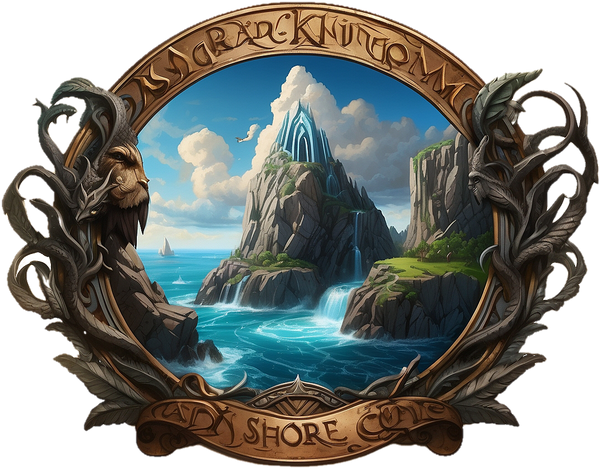Viking Tales: The Sword That Divides
Share
They say the blade was forged before the gods had names.
In the depths of a world not yet lit by sun or fire, something moved beneath the mountains. It was not man, nor beast, nor god. It had no tongue, no clan, and no laws. But it knew the secret of division, of separating stone from stone, sky from earth, and thought from shadow.
From this knowing came a blade, not unlike the legendary weapons forged by gods, feared more for their meaning than their might. It simply came into being, as if willed by the fracture at the center of all things.
The runes called it Fjarskera — the Far-Cleaver. The sword that could cut anything.
But it was not made for glory.
Centuries passed. Names rose and fell like smoke. Gods battled, empires burned, and the blade slept, buried beneath glacial stone in a cave no map dared mark. Until one day, a man came, nameless as the one who made it.
He was a smith, born to heat and hardship. His hands bore the calluses of a thousand weapons — none his own. When raiders burned his village, they left him alive. Said he was “not worth the blade.” His kin were ash. His forge was cold. So he walked.
The dreams started after the seventh night on the ice. Dreams of a cave that breathed, a light that whispered, and a blade buried in silence. He followed them not out of belief, but because belief was all he had left.
And there it was. Wedged in a wall of frozen black rock. No scabbard. No inscription. Only a shimmer, like light dying on steel.
He took it.
The cave did not collapse. The heavens did not thunder. But the silence grew deeper, as if the world had inhaled and forgotten how to exhale.
Fjarskera was not heavy. It balanced in the hand like thought—light, fast, absolute.
The first time he swung it, he meant only to clear a fallen branch. Instead, the sword carved through it, the tree behind it, and the stone behind the tree. The line left on the mountain did not smoke. It did not bleed. It simply was.
That night, the dreams returned. But now they watched him.
He wandered. The lands he crossed were brittle with war. Kings raised false banners. Priests burned rivals in the name of peace. In every village, people knelt to things they feared.
When he walked into a chieftain’s hall and laid Fjarskera on the table, the warlord laughed. Said no blade could touch him.
He didn’t laugh when the sword cleaved the oaken throne in two, without leaving a mark on the man himself.
“I could have,” the smith said. “But I didn’t.”
From that moment, the whispers began. A man with a sword that cuts anything. A blade sharper than vengeance, swifter than fate. Some sought him to follow. Others, to kill.
But none who raised steel against him survived the draw of Fjarskera.
It was not long before even the gods noticed.
One night, as he stood beneath the auroras, a woman approached. She wore a cloak of feathers and eyes like flint. He knew her name before she spoke it: Skuld, the seer of things yet to come.
“That sword,” she said, “does not belong to you.”
“No,” he answered. “But it came to me.”
“It divides more than flesh,” she warned. “It severs trust. Cuts truth from illusion. Use it long enough, and you’ll forget which is which.”
“I already have.”
She looked at him then, not as a god does a mortal, but as a soul does another who knows suffering.
“You can cut the world in half with that blade. But will it be better once it’s broken?”
There was a king in the south who feared nothing but prophecy. His seers told him a sword would come, wielded by a man with fire in his past and ice in his gaze. That sword would undo his kingdom, not with blood, but with clarity.
So the king sent an army.
The smith met them on a field of frost. He did not shout. He did not charge. He only drew the blade.
When Fjarskera passed through them, the army did not scream. They simply... separated. Metal split, armor cracked, the very air shivered. And yet, the ground remained unstained.
Those who survived dropped their weapons and fled. Not from fear of death, but from the truth that they’d seen something no mortal should: a cut so clean it erased purpose.
He stood alone in the field, the blade still humming in his hand. It was then he realized: Fjarskera had never thirsted for blood. It thirsted for division, not in battle, but in the heart.
With every swing, he had not just parted flesh or steel. He had split loyalty from doubt, vengeance from justice, man from myth.
He had become the sword.
The last we know of him comes from a skald’s half-sung verse:
“He came with no name, and left with no shadow.
His sword drew the line between gods and ghosts.
And when he chose not to cut, the world was spared its end.”
Some say he returned the blade to the mountain. Others claim he walked into the sea, and the water itself parted.
But the truth is simpler.
Somewhere, the sword waits — not for a warrior, but for someone who understands what it truly does.
Not cut.
Not kill.
Divide.
